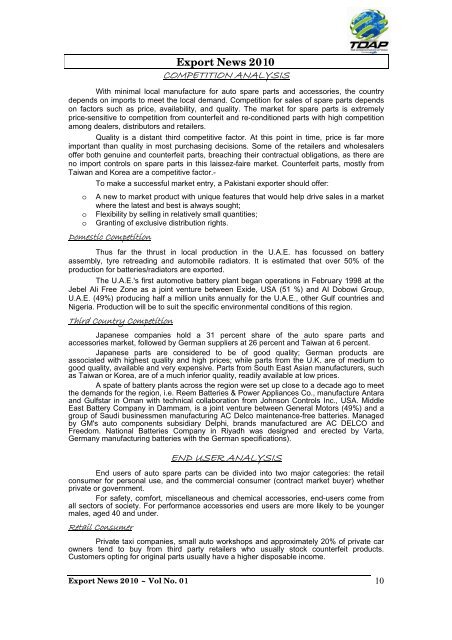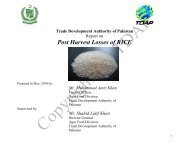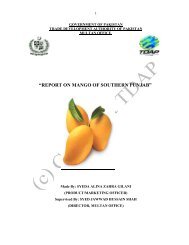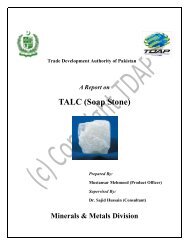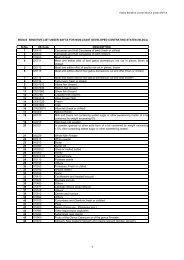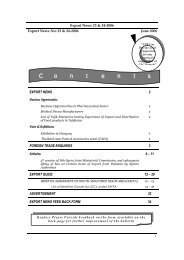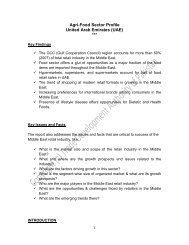GENERAL INFORMATION - Trade Development Authority Of Pakistan
GENERAL INFORMATION - Trade Development Authority Of Pakistan
GENERAL INFORMATION - Trade Development Authority Of Pakistan
Create successful ePaper yourself
Turn your PDF publications into a flip-book with our unique Google optimized e-Paper software.
Export News 2010<br />
COMPETITION ANALYSIS<br />
With minimal local manufacture for auto spare parts and accessories, the country<br />
depends on imports to meet the local demand. Competition for sales of spare parts depends<br />
on factors such as price, availability, and quality. The market for spare parts is extremely<br />
price-sensitive to competition from counterfeit and re-conditioned parts with high competition<br />
among dealers, distributors and retailers.<br />
Quality is a distant third competitive factor. At this point in time, price is far more<br />
important than quality in most purchasing decisions. Some of the retailers and wholesalers<br />
offer both genuine and counterfeit parts, breaching their contractual obligations, as there are<br />
no import controls on spare parts in this laissez-faire market. Counterfeit parts, mostly from<br />
Taiwan and Korea are a competitive factor.-<br />
To make a successful market entry, a <strong>Pakistan</strong>i exporter should offer:<br />
o A new to market product with unique features that would help drive sales in a market<br />
where the latest and best is always sought;<br />
o Flexibility by selling in relatively small quantities;<br />
o Granting of exclusive distribution rights.<br />
Domestic Competition<br />
Thus far the thrust in local production in the U.A.E. has focussed on battery<br />
assembly, tyre retreading and automobile radiators. It is estimated that over 50% of the<br />
production for batteries/radiators are exported.<br />
The U.A.E.'s first automotive battery plant began operations in February 1998 at the<br />
Jebel Ali Free Zone as a joint venture between Exide, USA (51 %) and AI Dobowi Group,<br />
U.A.E. (49%) producing half a million units annually for the U.A.E., other Gulf countries and<br />
Nigeria. Production will be to suit the specific environmental conditions of this region.<br />
Third Country Competit ion<br />
Japanese companies hold a 31 percent share of the auto spare parts and<br />
accessories market, followed by German suppliers at 26 percent and Taiwan at 6 percent.<br />
Japanese parts are considered to be of good quality; German products are<br />
associated with highest quality and high prices; while parts from the U.K. are of medium to<br />
good quality, available and very expensive. Parts from South East Asian manufacturers, such<br />
as Taiwan or Korea, are of a much inferior quality, readily available at low prices.<br />
A spate of battery plants across the region were set up close to a decade ago to meet<br />
the demands for the region, i.e. Reem Batteries & Power Appliances Co., manufacture Antara<br />
and Gulfstar in Oman with technical collaboration from Johnson Controls Inc., USA. Middle<br />
East Battery Company in Dammam, is a joint venture between General Motors (49%) and a<br />
group of Saudi businessmen manufacturing AC Delco maintenance-free batteries. Managed<br />
by GM's auto components subsidiary Delphi, brands manufactured are AC DELCO and<br />
Freedom. National Batteries Company in Riyadh was designed and erected by Varta,<br />
Germany manufacturing batteries with the German specifications).<br />
END USER ANALYSIS<br />
End users of auto spare parts can be divided into two major categories: the retail<br />
consumer for personal use, and the commercial consumer (contract market buyer) whether<br />
private or government.<br />
For safety, comfort, miscellaneous and chemical accessories, end-users come from<br />
all sectors of society. For performance accessories end users are more likely to be younger<br />
males, aged 40 and under.<br />
Retail Consumer<br />
Private taxi companies, small auto workshops and approximately 20% of private car<br />
owners tend to buy from third party retailers who usually stock counterfeit products.<br />
Customers opting for original parts usually have a higher disposable income.<br />
Export News 2010 ~ Vol No. 01<br />
10


